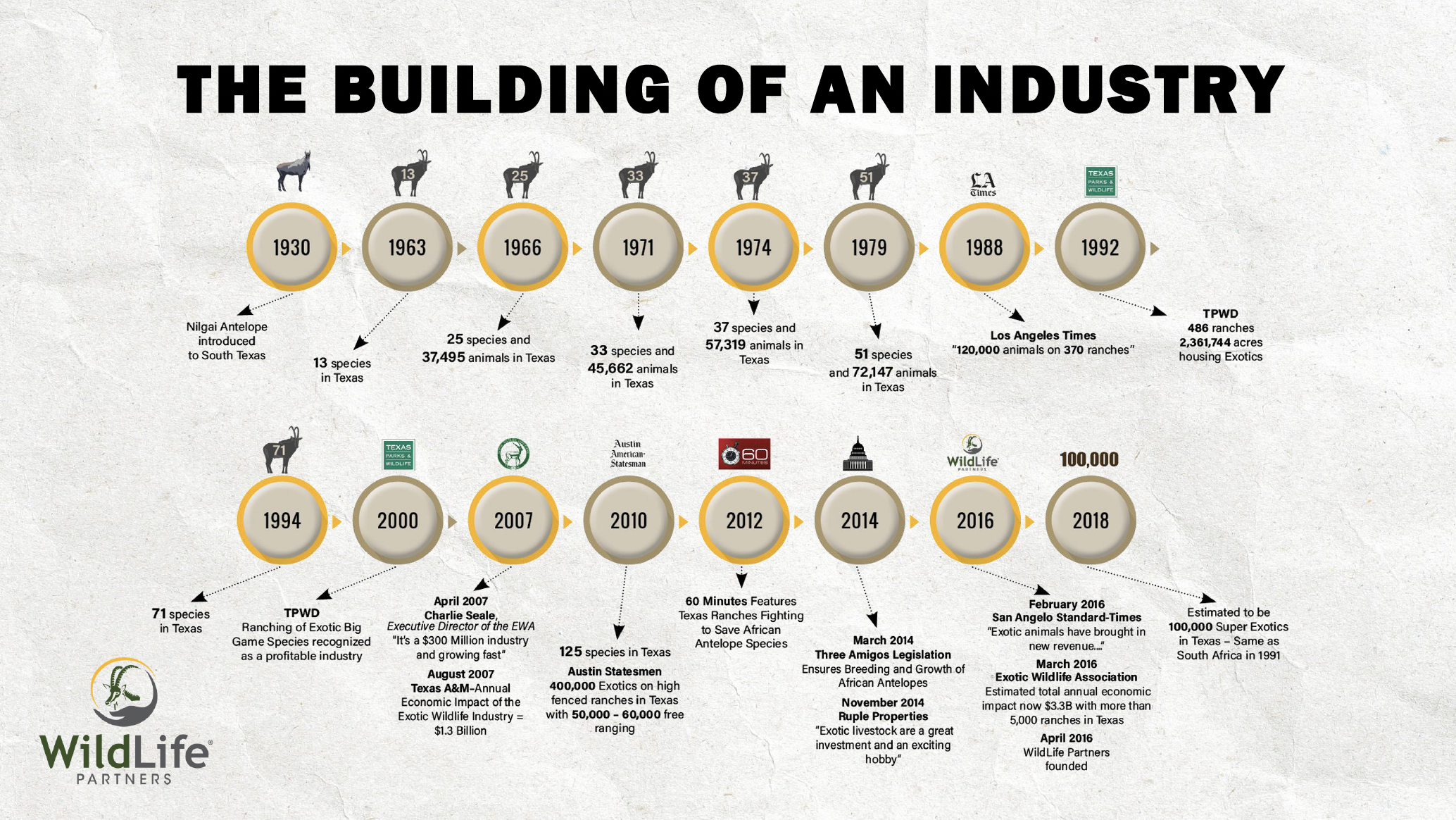Exotic Industry & the History of Exotics in Texas

Currently there are more than 5500 ranches in Texas with exotic wildlife. This represents staggering growth since the industries humble beginnings. Ranches that own exotics are primarily made up of wealthy landowners that love wildlife and are firm believers in conservation. We categorize these ranches into 3 groups.
- Private ranches that occasionally hunt exotics (2500 ranches)
- Private Ranches that do not ever hunt exotics (2500 ranches)
- Commercial Hunting Ranches open to the public (approximately 500 ranches)
Private Ranches
These are generally wealthy professional people that have purchased a recreational property for personal use. The owners of these properties are generally lovers of the outdoors and wildlife. For the last 50 years, numerous landowners in Texas have purchased exotic wildlife for the purpose of personal enjoyment, conservation, and private hunting opportunities. These ranches are not being operated for commercial purposes.
Commercial Hunting Ranches
These ranches are typically not breeding operations. They are open to anyone that would like to come and harvest an animal. These facilities purchase stock based upon hunting demand. They are consumers of wildlife, not a producer. While we do not participate in this aspect of the industry, commercial hunting adds value and demand to the breeding industry as a whole.
History of Exotic Wildlife in Texas
The Exotic Wildlife industry in Texas built its foundation on the basis of capitalism. The King Ranch was the first in Texas to acquire exotic wildlife for commercial purposes. They purchased the initial brood stock of nilgai antelope from the San Diego Zoological Garden in the late 1920s. The motive was to offset cattle price fluctuations. Nilgai have been a huge success. Today, the King Ranch alone, is home to approximately 12,000, with thousands more of these of these majestic animals on other Texas ranches.
In the early 1960s the curator of the San Antonio Zoo, Fred Stark, mentioned he had surplus animals. He suggested that Charlie Schreiner of the YO Ranch, take some of them to see how they would adapt. The first animals to arrive were blackbuck antelope and aoudad sheep. They successfully acclimated and were soon followed by axis deer. The motive for the acquisition was to breed the animals for conservation purposes. The effort was so successful that within a short time, animals were being sold to zoos while others were sent back to their native lands to replenish dwindling herds. Breeding was highly successful and eventually management was required to limit size of the herd. This transformed what started as an altruistic conservation project, into a source of cash flow for the ranch. Hunting exotics for profit became one of the primary sources of revenue for the ailing ranch during drought years. As the ranch prospered, other exotics were added to the property. All of which came from zoos. Fallow deer from England, sika deer from Japan, barasingha from India, and Pere David deer from China were all part of the menagerie. While many species were hunted, numerous others were not. They were there strictly for the conservation.
As the result of tremendous demand from private landowners all over the state, the industry has experienced significant growth over the last 50 years. Today there are thousands of ranches with exotics and more than 125 species found roaming properties within the state. This demand has kept the value of exotic wildlife on the increase for many years.
Below are links in a chronological order that show a time line for both the industry in Texas and in Africa. The growth for both Texas and Africa over the last 20 years is unrivaled both most industries across the globe and today continues to out produce many traditional investment vehicles such as stocks, bonds and mutual funds.

History in Texas
History in Africa
| June 1991 | The Game Theft Act of 1991 – Game Animals are now Private Property |
| May 2005 | Stud Game Breeders is Formed |
| September 2010 | Cyril Ramaphosa joins Stud Game Breeders; |
| November 2010 | Norman Adami joins Stud Game Breeders |
| April 2012 | Wildlife prices too big for genes? |
| September 2012 | Buffalo bull fetches record R26 Million |
| March 2014 | A Bull Market of a Different Kind – new Record set |
| September 2014 | Cyril Ramaphosa in line of fire over profits from game farm |
| January 2015 | Buffalo Horns Worth Millions Lure South African Billionaires |
| February 2016 | World’s Most Expensive African Buffalo Valued at $11,100,000 |
| September 2016 | Limpopo Buffalo Sells for R168 Million ($12,500,000) |




